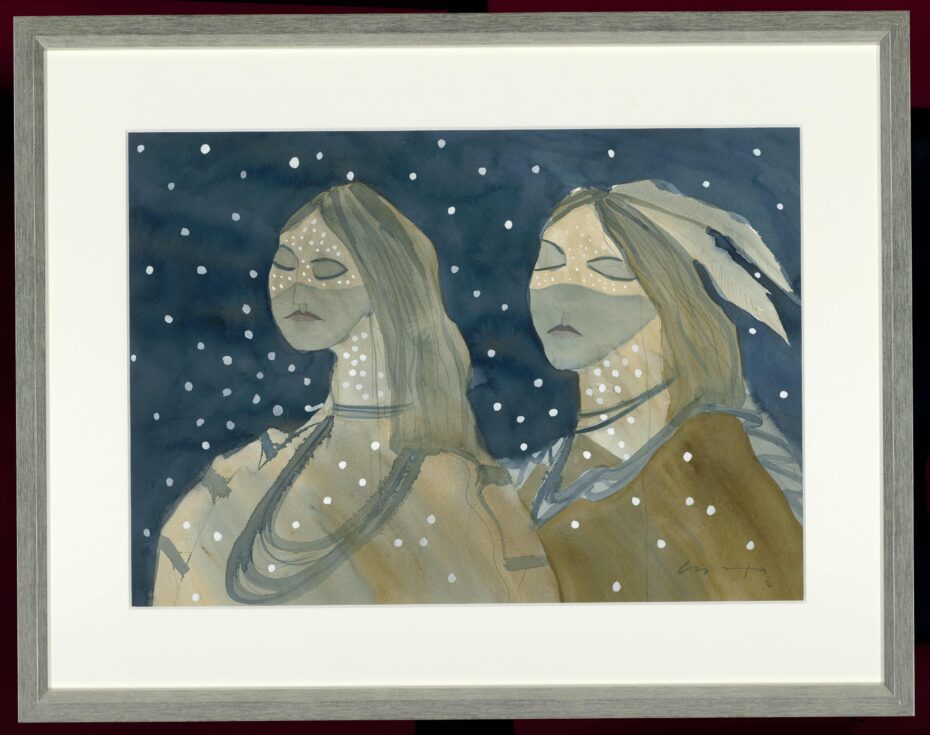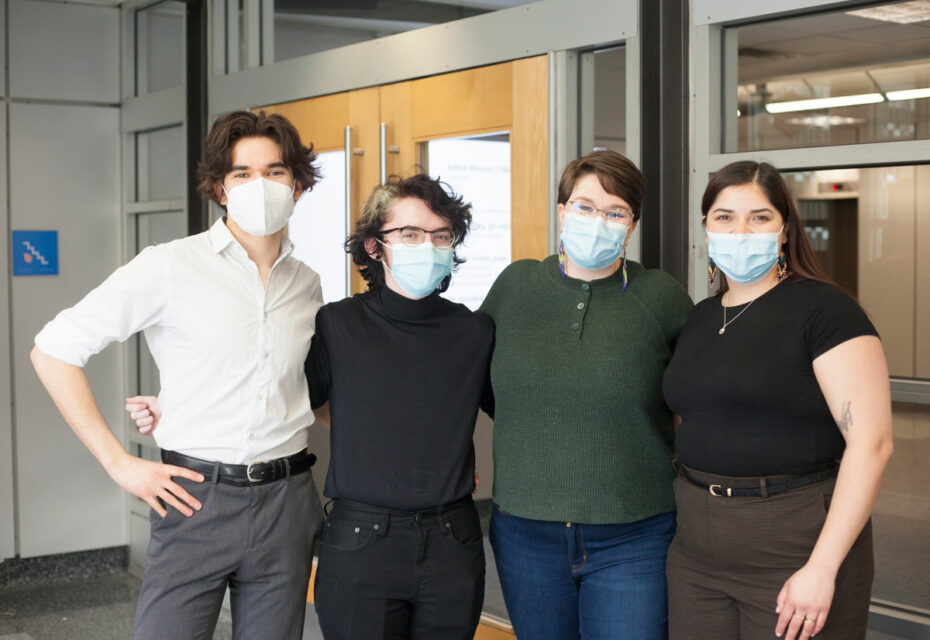
A lot of people pass through the McConnell Engineering Building each day – bustling to and from class, the cafeteria and other destinations on the west side of campus.
However, an important new addition to the lobby will give visitors pause to stop, look and admire.
Launched on April 13, Projections: Kwe is a digital exhibit featuring 30 artworks from a variety of First Nations, Inuit and Métis artists projected onto the wall of the McConnell Engineering Building lobby. The exhibit will run for one year, after which the Faculty of Engineering and Visual Arts Collection will continue to collaborate and engage with different groups for upcoming Projections exhibits.
In concert with Projections: Kwe, the Faculty of Engineering has installed two permanent artworks on the first floor of the McConnell Engineering Building from Benjamin Chee Chee: Afternoon Flight and Friends.
Indigenous student-led initiative

The project was the brainchild of the Indigenous Inclusion Committee (IIC) of the Engineering Undergraduate Society. Founded by Isabelle Prévost-Aubin (Métis Nation), the IIC includes Dallas Karonhia’no:ron Canady-Binette (Kanesatake’ro:non, Kanien’keha:ka), Kayleigh Spencer (James Bay Cree), Jocelyne Couture (Métis Nation of Ontario), and Jonas Henderson (Kalaaleq).
“As a collective of Indigenous students both within and outside of the Faculty of Engineering, the IIC came together to select the pieces of art that you see on display today,” said the IIC in its Curatorial Statement. “Of the utmost importance to the IIC was choosing works from different creative mediums, made by artists that hail from a variety of First Nations, Inuit and Métis communities. Featured before you, for example, are a collection of paintings, such as Norval Morrisseau’s Shaman Surrounded by Ancestral Spirit Totem (1977), photographs, like those of Nadia Myre’s Meditations on Red (2013), and sculptures, like Tytoosie Tunnillie’s Sedna. This was done to highlight the longstanding diversity of Indigenous peoples across Turtle Island, as well as the rich and vibrant nature of Indigenous creativity.”
Collaborative effort
Supported by McGill’s Visual Arts Collection (VAC); the Dean’s Office of the Faculty of Engineering; and the Provost’s Indigenous Initiatives Office; the members of the IIC went through the University’s collection of Indigenous art, numbering some 140 pieces, in order to make the final selections.
“During the selection process, the first critical criterion was the transparency of the history of the paintings, i.e. whether the artists and their Nations were explicitly known, as well as the manner in which the artwork was obtained by the University,” said Prévost-Aubin of the IIC. “Since different nations are recognized for various techniques within their art styles, and particularly given the format of this installation, we wanted to make sure the variety of artistry was a notable aspect of this project. Finally, the bicentennial values of indigenous resilience and excellence were emphasized during the selection of the artwork.”
52 Calls to Action
In his remarks, Provost Christopher Manfredi spoke of the efforts to integrate “Indigenous presence in new infrastructure and landscaping projects,” as per the 52 Calls to Action outlined in the Final Report of the Provost’s Task Force on Indigenous Studies and Indigenous Education.
“The Projections: Kwe exhibit also speaks to that vision by displaying Indigenous artwork from McGill University’s own collection in public spaces. I am particularly pleased that this innovative digital exhibit was born out of an Indigenous student-led effort to raise intercultural awareness with their peers in the Faculty of Engineering. I commend them for their efforts, as well as the collaborative efforts between several units over the course of several months to see this project to fruition.”
In the decision-making seat
The impact of having Indigenous art in such prominent display was not lost on Dayna Danger, McGill’s Mellon Indigenous Artist in Residence.
“My experience has always been seeing other types of artwork and paintings of historical figures, but then all of a sudden you turn the corner and you see a [Saulteaux First Nations Artist] Robert Houle and an Anishinaabe painting. That’s fantastic,” said Danger. “Sharing our visual representation is really important because it lets people know that we’ve been here, we’ve always been here, and we want to inspire folks to make them think outside of the box.
“My hope is that this inspires you to want to come and visit these artworks, sit with them, bring your favourite cup of tea, bring a coffee and look at the splendour that is the vast world of Indigenous art.”
First step in a long journey
During the virtual launch, several speakers noted that Projections: Kwe can’t be seen as a one-off initiative. It is a stepping stone toward a more equitable and just society. There is more work – a lot more – to be done.
Projections: Kwe “is a step toward making the Faculty [of Engineering] and McGill more inclusive to our Indigenous communities, [with an] emphasis on Indigenous voices within the professions of engineering, architecture, and urban planning. This is just one small step in a longer path that we must travel,” said Jim Nicell, Dean of the Faculty of Engineering. “The Faculty of Engineering has a key role to play in supporting our Indigenous students and building awareness within our programs to promote more equitable practices in the work of our professions.”
“The Projections: Kwe art installation was formed collaboratively with the help of many perspectives, voices, and efforts. It is the step in the right direction but it is part of a much larger movement, a march for Indigenous rights, sovereignty and respect,” said Prévost-Aubin. “This project is meant to be one initiative among many and I look forward to seeing what other initiatives and resources the Faculty of Engineering implements for Indigenous students as well as their communities for the future years to come.”
Get more information about Projections: Kwe
Watch the virtual launch of Projections: Kwe
